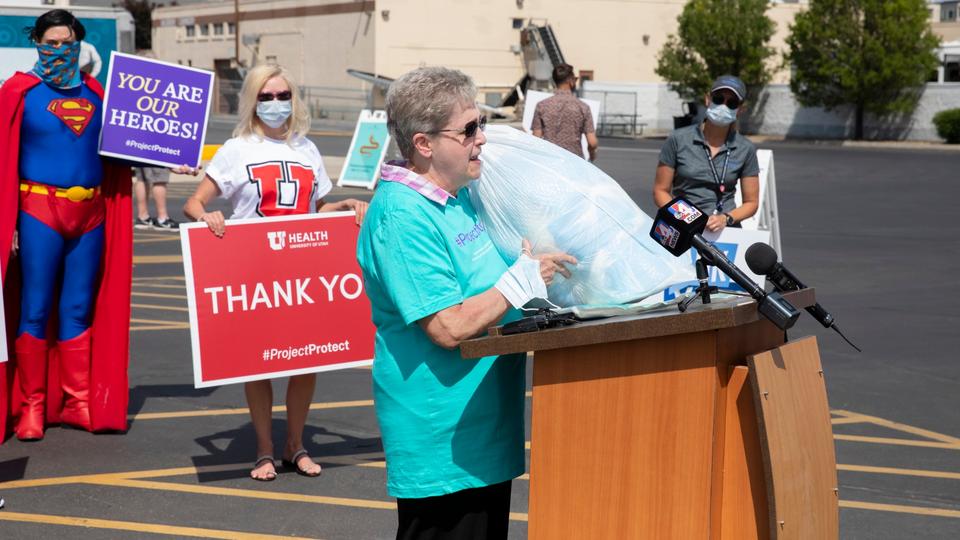Project Protect, an initiative sponsored by University of Utah Health and Intermountain Health Care in partnership with Latter-day Saint Charities, recently achieved its goal to collect 5 million clinical face masks that are being distributed to Utah health care workers fighting COVID-19.
- Project Protect Initiative
- Project Protect Initiative
- Project Protect Initiative
- Project Protect Initiative
- Project Protect Initiative
- Project Protect Initiative
- Project Protect Initiative
- Project Protect Initiative
| Temple Square is always beautiful in the springtime. Gardeners work to prepare the ground for General Conference. © 2012 Intellectual Reserve, Inc. All rights reserved. | 1 / 2 |
“When a pandemic comes, then suddenly you realize there are shortages,” said Sister Sharon Eubank, president of Latter-day Saint Charities and first counselor in the Relief Society general presidency. “This is a way for us to practice what it means to be prepared.”
In mid-May, Sister Eubank stood near the Murray Deseret Industries’ donation drive-thru lane accompanied by other representatives from the local partnership that organized Project Protect.
While there, Sister Eubank and other members of the Church’s Relief Society general presidency, including President Jean B. Bingham and Sister Reyna I. Aburto, second counselor, were among project organizers that greeted service participants with applause and signs inscribed with thank you messages.
On its eleventh week and near the finish line, Project Protect representatives gathered to celebrate the volunteers that drove up and handed back assembled clinical face masks during one of Project Protect’s final weeks.
Final Count
An extra week was added in June to give volunteers one last chance to participate in the community effort. On June 20, volunteers gathered up the last of the masks sewn by 57,500 registered volunteers from around the state of Utah. In all, those volunteers donated around 800,000 hours to sew 5.75 million masks for health care workers.
“It’s just wonderful that the community has rallied,” said Dr. Angelo Giardino, who works as University of Utah’s chair of pediatrics and Intermountain Primary Children Hospital’s Chief Medical Officer.
Dr. Giardino and some of his colleagues from University of Utah Health also accompanied partnership representatives from Intermountain Health Care to thank volunteers for their participation on behalf of Utah health care workers that are benefitting from the medical-grade clinical face mask donation.
“Early in this pandemic we were really afraid that we would not have enough personal protective equipment for all of the care providers and the families and the patients,” said Dr. Giardino.
Dr. Giardino shared that before COVID-19 cases rapidly increased in Utah, he reached out to Sister Eubank to explain the need for additional PPE, and as President of the Church’s humanitarian arm, she quickly offered Latter-day Saint Charities’ assistance.
“She said, ‘We’re there. We’ll take care of it,’” said Dr. Giardino. “We have enough now to support ourselves here, that’s what we’ve done. That’s 5 million masks!”
In an effort to provide relief for state health care workers who treat COVID-19 patients, beginning in mid-April, thousands of service participants throughout Utah registered to pick up precut, medical-grade material each Saturday at one of five Deseret Industries locations, including American Fork; Harrisville; Layton; Murray and Riverton. In southern Utah, volunteers received their kits at Dixie Regional Medical Center in St. George.
Each week, volunteers dedicated an average of 12 to 16 sewing hours to assemble each face-mask kit, which held 100 units.
Upon completion, Project Protect participants returned them to the same location.

Project Protect Initiative
Cathie Owens, a Latter-day Saint from Sandy, Utah, speaks to members of the media during the Project Protect news conference at a Deseret Industries location in Murray, Utah, on Saturday, May 16, 2020. Owens voluntarily sewed over 2,200 medical-grade clinical face masks for Utah health care workers during the project’s duration.2020 by Intellectual Reserve, Inc. All rights reserved.“I’m just grateful to be a part of it,” said Cathie Owens, a Latter-day Saint from Sandy, Utah, who sewed over 2,200 clinical face masks during the project’s duration.
In addition to the celebratory atmosphere surrounding the Deseret Industries location in Murray, Project Protect’s organizers scheduled a press conference to thank the community, including volunteers like Owens.
During the media event, the Utah-based partnership also announced that the goal to assemble 5 million medical-grade clinical face masks with the community’s help had been successfully accomplished.
“[Today] we will receive our five millionth mask that’s been sewn by our community,” said Dan Liljenquist, senior vice president and chief strategy officer for Intermountain Healthcare
“In addition to that, we produced, at the same time, well over 100,000 face shields for caregivers and also, with the help of Beehive Clothing, have now produced close to 100,000 reusable gowns: the exact equipment that our caregivers need to stay safe and take care of our patients in our community who suffer from COVID-19,” added Liljenquist.
“Today we’re celebrating 5 million and it’s worth celebrating,” said Sister Eubank, during the press conference.
“If we paid people minimum wage, it would cost more than $5 billion to do what you volunteers have done. It’s a tremendous commitment and I appreciate what people have said, ‘We wouldn’t do it for the money, but we’ll do it for the community,’” she added.
Sister Eubank explained that because of Project Protect’s success in Utah, the plan is to replicate this type of service initiative in the United States and other countries: to assemble millions of personal protective equipment items for medical workers fighting the COVID-19 disease.
Currently, the Church is participating in about 600 COVID-19 relief projects in 129 countries.
As of June 2020, Latter-day Saint Charities and Latter-day Saints around the world have donated millions of clinical face masks and medical-grade gowns for health care workers and provided hygiene supplies and personal protective equipment, as well as cash and other commodities to support COVID-19 relief efforts.